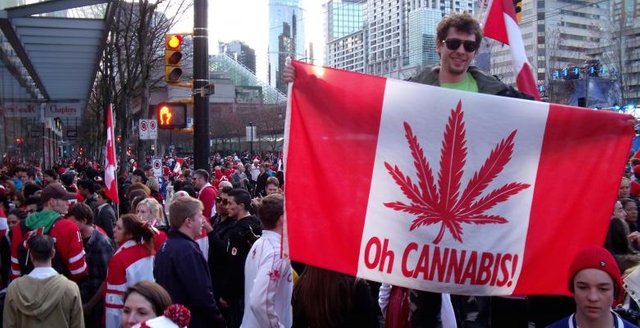
It’s a historic day in Canada. Cannabis has finally been legalized for recreational use, and a number of regulations regarding the sale and growing of marijuana have changed. Canada is the second country in the world to legalize marijuana, after Uruguay legalized it in 2013. Contrary to popular belief, cannabis is technically not legal in the Netherlands, just tolerated.
This is excellent progress for the country, and Canada is going a step further than U.S. states that have legalized marijuana – the government plans to pardon those who have been convicted on possession charges, giving them a clean slate.
Former governor of Minnesota Jesse Ventura said on Facebook, “Canada, oh Canada. Hooray for Canada. The United States isn't leading the way anymore on this issue. Maybe peer pressure from our northern neighbor will finally get us to modernize our outlook on this incredible plant.”
In the midterm elections, medical use will be on the ballot in Missouri and Utah, and recreational use will be on the ballot in the border states of Michigan and North Dakota. Hopefully, this move in Canada will have momentum and these states will have more liberal policies.
The news isn’t good everywhere in America. The U.S. Customs Border and Protection Agency said that even if one has been granted amnesty for a previous pot-related criminal conviction, they may still be denied entry because CBP does not recognize foreign pardons.
Additionally, if a Canadian who is invested in the marijuana industry wishes to travel to the U.S. for their business (leisure is allowed though), they would likely be denied at the border, even if cannabis is legal in the state they are visiting. This is because marijuana is not legal on the federal level in the U.S.
On a positive note, within Canada, one can smoke in their home worry-free. The Toronto Police tweeted that reporting an adult for smoking a joint is “not a 9-1-1 call.” However, driving while intoxicated is still illegal.
Laws vary by province or territory, but generally, if you are old enough to drink, you are old enough to purchase pot, the exception is in Manitoba – where the drinking age is 18, but minimum age to use marijuana is 19. The age limit is more sensible than the U.S.’s age limit of 21 – which is the same as the drinking age.
There are different options for purchasing: online or at a shop, either private or government-owned. Provinces that currently only allow government sales, like Ontario, PEI, and Nova Scotia, may also allow private sales in the future. Prices will range from $6-$16 per gram, depending on the province or territory.
People have been lining up overnight to be among the first to purchase pot legally, and queues are expected to be long all day. The BBC reports that a man in Newfoundland lined up at 8 PM the night before so he could “make history.”
There are concerns that supply will not be enough and shops will be understaffed in the early days of legal pot. This could mean that consumers might turn to the black market.
Legal marijuana is still in its infancy in Canada, but it is expected to be a growing industry with hundreds of businesses expected to open in the near future. There are over 100 licensed shops across the country, but there are many unlicensed shops that have either been allowed to remain open, or are operating in a legal grey area. As time goes on, these once-successful unlicensed shops will have to close.
Canada will be a first-hand testing ground for all of the arguments made for years by marijuana advocates. Tourism will be boosted. Jobs will be created. Police won’t be tied up dealing with pot smokers. Marijuana will more easily be kept out of minors’ hands and gangs will not be making money. We will hopefully start to see solid data to back many of these assertions.
Best of all, the federal government estimates that tax revenue will be in excess of $400 million a year. It will be interesting to see how that money is used and/or reinvested into government programs.
By Angie Weisgal